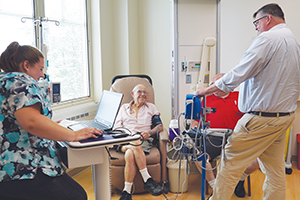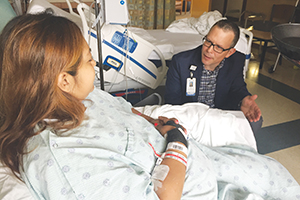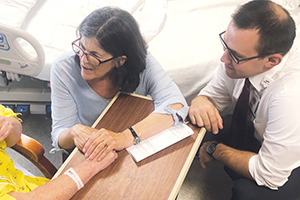By JULIE MINDA
According to a sampling of chaplains in the Catholic health ministry, a growing number of patients say they either don't believe in God, or they self-identify as spiritual people who believe in God but are not affiliated with any particular religion.
To make sure that patients can get spiritual comfort to lessen their suffering, should they so desire, no matter their level of religiosity or spirituality, chaplains said they have been tailoring their word choice, communications style and pastoral care services to the individual.

Joby Brown, a staff chaplain at Ascension Columbia St. Mary's Hospital Ozaukee, visits Elroy Knepprath in that Mequon, Wisconsin, facility. Oncology nurse Shana Risse is at left. A focus of Brown's role is to provide spiritual care to patients.
"We meet people where they are, not where we think they should be," said Art Maddock, manager of pastoral services for Mercy Northwest Arkansas, part of the Chesterfield, Missouri-based Mercy system.
Ministry chaplains who spoke to Catholic Health World said while Catholic patients may be spiritually fortified by attending Mass or participating in the sacraments, people with no formal faith tradition may find transcendence in music, poetry or even in a spirited conversation about their favorite sport. Chaplains said they strive to understand the gestalt of their individual patients and connect in ways that are meaningful to those patients.
"Chaplains are here to listen, offer support, perhaps even make a plan to survive the day and ultimately aid in well-being and ongoing ministry of grace and compassion," whatever the patients' religious background or lack thereof, said Charlie Dey, team leader of the pastoral care department at SSM Health Saint Louis University Hospital.
Nathaniel Blanton Hibner, CHA director of ethics, said that, of course, even atheists ponder deep existential questions about suffering, human existence and the meaning of their lives. "They may not have the same vocabulary or tradition to define or label it," he said.
Maddock said that is where adaptive communications comes in to play: "We ask about their spirituality in broader terms: 'What gives you peace? What gives you meaning?'"
Individualized spirituality
Northwest Arkansas is home to a growing population that is also increasingly diverse in its ethnicity and religious traditions owing to the hiring practices of Wal-Mart and Tyson Foods, which are headquartered in Northwest Arkansas, Maddock said.

Art Maddock, manager of pastoral services for Mercy Northwest Arkansas, visits Betsy Aguilar of Fayetteville, Arkansas, during her stay at Mercy Hospital Northwest Arkansas in Rogers. Maddock and Aguilar prayed together during the visit.
Add to that diversity the trend toward individualization of beliefs and spiritual practices, and it's clear to see why Maddock became practiced at being sensitive to, and respectful of, the myriad ways people connect with the divine.
When Maddock meets a new patient, "First and foremost, I explore with the person aspects of meaning and importance to him or her. From the response I am able to determine if faith is an important element" to the individual. "If it is not, I focus on those areas that bring them hope and peace.
"In my conversation with patients I also use broader terms related to faith and spirituality. To someone atheistic or agnostic, being spiritual would be how they identify and connect with something greater than themselves. I relate it to what brings meaning, peace, and hope to (their) life. Another way to say it is 'what makes you come alive?'"
Sue Kellett, a chaplain at Saint Louis University Hospital, said, "Even when people are not religious, they still want us to sit with them" and determine how to meet their spiritual needs.
Assessing needs
CHA's Hibner said the Ethical and Religious Directives for Catholic Health Care Services "outline very clearly that we are to meet the spiritual needs of all — not just Catholics — and that pastoral care departments should have individuals on staff or connections with people in the community" with expertise in various faith traditions.

Sue Kellett, a chaplain at SSM Health Saint Louis University Hospital, and Charlie Dey, team leader of the pastoral care department at the hospital, comfort a patient.
It is now becoming increasingly common for ministry members to conduct a kind of spiritual triage by routinely asking questions as part of the patient intake process. The questions — normally asked by clinicians or admissions staff — gauge whether there is spiritual pain, or deep and lingering sadness or other unaddressed mental health concerns. Such assessments flag those who might benefit from appropriate follow-up with a chaplain and connection to services.
Sacred time
Chaplains who spoke to Catholic Health World said that in one-on-one conversations with patients who are open to a spiritual care consult, they strive to gain a nuanced understanding of an individual's concerns and be present to them in prayer and in substantive conversation.
Often chaplains will choose their words to fit the patients' particular spiritual background, said Joby Brown, staff chaplain at Ascension Columbia St. Mary's Hospital Ozaukee in Mequon, Wisconsin.
Saint Louis University Hospital's Kellett said that when patients and families do identify with a particular church or religion, she speaks with them about how their beliefs and church teachings fortify them when they are suffering. Prayer is almost always a part of those encounters. With a person who is religiously unaffiliated, atheistic or agnostic, Kellett still discusses meaning and hope, but rather than talk about faith or prayer traditions, she may ask how they find fulfilment and renewal.
Finding meaning
Brown said even a nonreligious person may welcome the compassionate council of a chaplain who can help them reconcile with their new reality after illness and injury causes a permanent loss of ability.
Brown said as chaplains "touch on those things that immediately come to the surface as spiritual for the person," be it making music, hiking on a mountain path or bowling the perfect game. "We can let them guide the conversation." Active listening builds trust. "I have experienced many of those people seeking the chaplain out later when they have more serious issues" during their hospital stays.
Kellett said regardless of how people are living out their faith and spirituality, she finds it hugely meaningful to connect with patients, especially people who are victims of violence, and to try to help them navigate through the emotional, physical and spiritual trauma. "We're seeing so many people injured and alone, and it's important to develop that relationship and forge a bond.
"It's a privilege for me to walk with people. It is a sacred time, to be welcomed in and to share with them," she said.
People in the US are changing their perspectives on religion, spirituality
The Pew Research Center's Religion and Public Life division conducts polls that ask about religious affiliation, churchgoing habits, belief in God, importance of religion and frequency of prayer. According to an Oct. 17 Pew Research Center article, "In U.S., Decline of Christianity Continues at Rapid Pace," over time, decreasing numbers of Americans are identifying as Christian and increasing numbers are claiming "none" as their religion.
In polling conducted in 2018 and 2019, 65 percent of American adults said they were Christian, down 12 percentage points over the past decade. Four percent of American adults said they are atheists and 17 percent said their religion is "nothing in particular" — both groups as well as people who said they are members of non-Christian religions have grown over the past decade.
The same article said the percentage of people who said they attend religious services at least once or twice a month is down 7 percentage points over the last decade.
According to Pew's Religious Landscape Study, conducted in 2007 and 2014, the percentage of people who believe in God has dropped from 71 percent to 63 percent. The percentage who said religion is not too or not at all important to them has risen from
16 percent of survey respondents to 22 percent from 2007 to 2014. The percentage who said they seldom or never pray increased from 18 percent to 23 percent during that same time period.
However, that Religious Landscape Study indicates that while fewer people are affiliated with a formal religion, more report they are feeling a sense of spiritual peace and well-being.
Fr. Charles Bouchard, CHA senior director, theology and sponsorship, cautioned that this trend toward spirituality devoid of outward expression brings up important questions, such as: If spirituality is totally internal, then are people who believe in a higher power ever called to do anything concrete? Can faith be totally spiritual without outward action in the context of relationships with others, to act upon the inward feelings?
Fr. Bouchard said it seems to him an entirely inward spirituality, devoid of outward practice, "would contradict the incarnation," or the bodily expression of a person's beliefs.